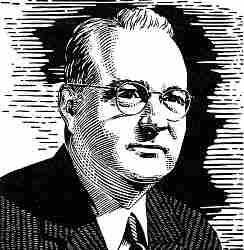|
A Radio Talk by Charles F. Kettering  I have referred in the
past to the importance of the Ethyl development in connection with the
war effort, peace time transportation and the conservation of our
petroleum resources. This afternoon I would like to pay tribute to all
of the men who worked on this project, and one in particular - a very
close friend and brilliant thinker - the late Thomas Midgley, Jr.
I have referred in the
past to the importance of the Ethyl development in connection with the
war effort, peace time transportation and the conservation of our
petroleum resources. This afternoon I would like to pay tribute to all
of the men who worked on this project, and one in particular - a very
close friend and brilliant thinker - the late Thomas Midgley, Jr.Young Midgley was descended from a long line of inventors - in fact, I believe one of his ancestors was an employee of James Watt, the father of the steam engine. This may have had something to do with the fact that young Tom was graduated from Cornell, 1911, as a mechanical engineer. But at the time of his death, he was president of the American Chemical Society. |








